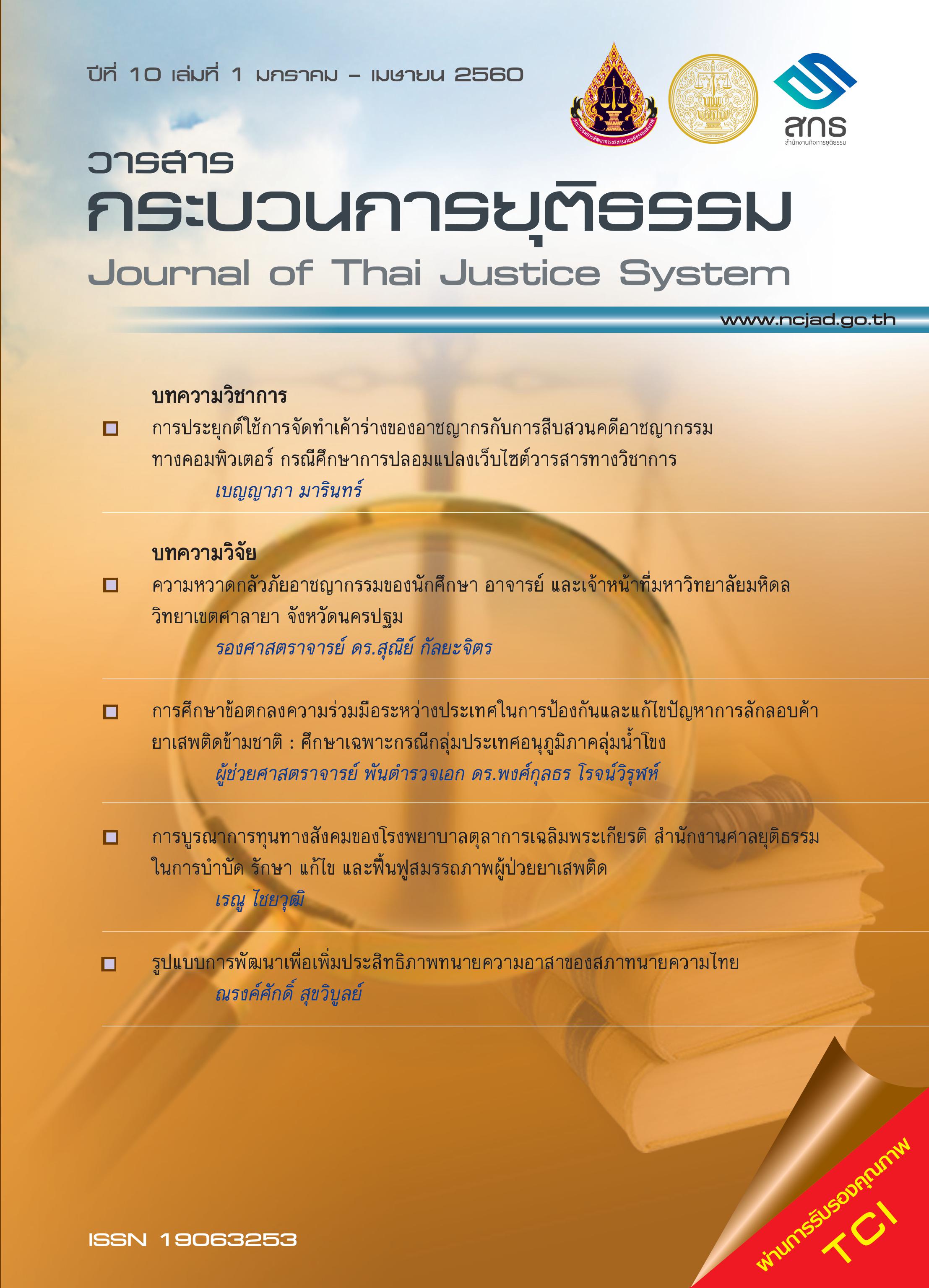การศึกษาข้อตกลงความร่วมมือระหว่างประเทศในการป้องกันและแก้ไขปัญหา การลักลอบค้ายาเสพติดข้ามชาติ : ศึกษาเฉพาะกรณีกลุ่มประเทศอนุภูมิภาคลุ่มน้ำโขง
Main Article Content
บทคัดย่อ
การวิจัยเรื่อง การศึกษาข้อตกลงความร่วมมือระหว่างประเทศในการป้องกันและแก้ไขปัญหาการลักลอบค้ายาเสพติดข้ามชาติ : ศึกษาเฉพาะกรณีกลุ่มประเทศอนุภูมิภาคลุ่มน้ำโขง มีวัตถุประสงค์เพื่อรวบรวมข้อตกลงความร่วมมือระหว่างประเทศที่เกี่ยวกับการป้องกันและแก้ไขปัญหาลักลอบค้ายาเสพติดข้ามชาติของกลุ่มประเทศอนุภูมิภาคลุ่มน้ำโขงให้เป็นระบบ เพื่อศึกษาปัญหา อุปสรรค ของข้อตกลงความร่วมมือระหว่างประเทศ ที่เกิดขึ้นและเพื่อเสนอแนะกรอบแนวทางการกำหนดข้อตกลงความร่วมมือระหว่างประเทศ เพื่อพัฒนา เสริมสร้างความร่วมมือในระดับนโยบายและระดับการปฏิบัติให้เกิดประสิทธิผลมากยิ่งขึ้น
การวิจัยครั้งนี้เป็นการวิจัยเอกสาร (Document Research) ผู้วิจัยจะทำการศึกษารวบรวมข้อมูลจากงานวิจัย เอกสารทางวิชาการ บทความ หนังสือ และวรรณกรรมที่เกี่ยวข้อง
ผลการวิจัยครั้งนี้ พบว่าข้อตกลงในการป้องกันและปราบปรามยาเสพติดระหว่างประเทศอนุภูมิภาคลุ่มน้ำโขงมีตั้งแต่อดีต โดยการร่วมลงนามระหว่างไทย พม่า ลาว กัมพูชา เวียดนาม และจีน (ยูนนาน) ตั้งแต่ปี พ.ศ. 2535 ข้อตกลง และความร่วมมือด้านยาเสพติดจะเป็นไปในทิศทางการร่วมกันลงนามเพื่อสกัดกั้นยาเสพติดบริเวณชายแดน และการติดตามผู้ร้ายข้ามแดนในคดียาเสพติด โดยทุกประเทศได้ลงนามในสัญญา The United Nation Office of Drugs and Crimes (UNODC) ที่ผ่านมาข้อตกลงดังกล่าวประเทศไทยได้รับความร่วมมือค่อนข้างสูงกับประเทศลาว โดยระหว่างทั้งสองประเทศะมีข้อตกลงร่วมกันมากกว่าประเทศอื่นๆ ดังเช่น ประเทศจีน และเมียนมา ซึ่งให้ความร่วมมือกับประเทศไทยค่อนข้างน้อยกว่าหากเทียบกับประเทศลาว แม้ว่าในการลงนามตามสัญญาดังกล่าวทุกประเทศสัญญาว่าจะต้องให้ความร่วมมือต่อกันก็ตาม หากแต่ในทางปฏิบัติแล้วกลับให้ความร่วมมือระหว่างประเทศดังกล่าวกลับเป็นไปอย่างค่อยเป็นค่อยไปหรือค่อนข้างน้อย เพราะแต่ละประเทศต่างมีปัญหาเฉพาะของตนเอง เช่น ปัญหาทางด้านการเมืองภายในประเทศ หรืออาจเป็นเพราะว่าระหว่างประเทศไม่มีพื้นที่ชายแดนที่ติดกันปัญหาความร่วมมือระหว่างกันจึงมองไม่เห็นได้อย่างชัดเจน สิ่งเหล่านี้อาจเป็นปัญหา อุปสรรคที่สำคัญในการเสริมสร้างหรือส่งเสริมความร่วมมือระหว่างกันกับการป้องกันและแก้ไขปัญหายาเสพติดภายในกลุ่มอนุภูมิภาคลุ่มน้ำโขง ทั้งเพราะยาเสพติดเป็นอาชญากรรมข้ามชาติที่อาศัยช่องว่างดังกล่าว และสร้างปัญหาให้กับหลายๆ ประเทศที่เกี่ยวข้อง
อย่างไรก็ตาม กลุ่มประเทศในอนุภูมิภาคลุ่มน้ำโขง ต่างได้ตระหนักถึงสภาพปัญหายาเสพติดเป็นอย่างดี และต่างฝ่ายต่างได้พยายามจัดประชุมและจัดทำข้อตกลงร่วมกันมาโดยตลอดทั้งในระดับท้องถิ่น จนไปถึงความร่วมมือในระดับที่สูงขึ้นในรูปแบบทวิภาคี พหุภาคี หรือความพยายามในระดับนานาชาติ เช่น อนุภูมิภาค ภูมิภาค และขยายไปจนถึงระดับนานาชาติ ทุกประเทศต่างมีความกระตือรือร้นที่จะเข้าร่วมการป้องกันและปรามปรามยาเสพติด โดยผลการวิจัย พบว่า ประเทศเมียนม่าร์ และประเทศกัมพูชา ต่างพยายามที่จะเสริมสร้างและมีความเคลื่อนไหวเพื่อสร้างและให้ความร่วมมือให้มากขึ้นจากที่ผ่านมา ประเทศจีน และประเทศเวียดนามยังคงมีส่วนร่วมในการประชุม แต่ยังอาจกล่าวได้ว่ายังไม่มีกรอบความร่วมมือที่ชัดเจนหรือเป็นรูปธรรมเท่าที่ควร ส่วนประเทศลาวยังคงให้ความร่วมมือกับประเทศไทยเป็นอย่างดี
จากการวิจัยครั้งนี้ ผู้วิจัยได้เสนอกรอบแนวทางการกำหนดข้อตกลงความร่วมมือระหว่างประเทศ เพื่อพัฒนา เสริมสร้าง ความร่วมมือในระดับนโยบายและการปฏิบัติ ในการป้องกันและแก้ไขปัญหาลักลอบค้ายาเสพติดข้ามชาติ เพื่อให้เกิดความยั่งยืนและเห็นผลเป็นรูปธรรมจริง ดังนี้
- ด้านนโยบาย ควรสร้างกลไกสร้างความแน่นแฟ้นในความสัมพันธ์ระหว่างประเทศเพื่อให้เกิดความไว้เนื้อเชื่อใจระหว่างกัน นอกเหนือไปจากการให้ความช่วยเหลือระหว่างกันทางเศรษฐกิจ สังคม และวางตัวเป็นกลางทางการเมือง โดยมุ่งไปที่ประเด็นการสานสัมพันธ์เพื่อการให้ความช่วยเหลือซึ่งกันระหว่างประเทศมากกว่า
- ด้านการปฏิบัติ การศึกษาร่วมกันระหว่างประเทศถึงกลไกทางเทคนิค เช่น ความแตกต่างเรื่องของกฎหมายที่แตกต่างกันระหว่างประเทศ เพื่อลดอุปสรรคการให้ความร่วมมือการดำเนินคดีทางกฎหมายให้ถูกต้องหรือการให้ความช่วยเหลือซึ่งกันและกันด้านอื่นๆ
- ควรสร้างมาตรฐานการปฏิบัติในความร่วมมือระหว่างประเทศ โดยอาจกำหนดวิธีการประเมินผลคุณภาพความสัมพันธ์ระหว่างกัน เพื่อสนับสนุนกลไกการสร้างกรอบความร่วมมือระหว่างประเทศในเรื่องของภาพรวมการป้องกันและแก้ไขปัญหายาเสพติดข้ามชาติให้มีประสิทธิภาพมากขึ้น
Article Details
ต้นฉบับที่ได้รับการตีพิมพ์ในวารสาร เป็นลิขสิทธิ์ของวารสารกระบวนการยุติธรรม แต่ความคิดเห็นที่ปรากฏในเนื้อหาของบทความในวารสารกระบวนการยุติธรรม ถือเป็นความรับผิดชอบของผู้เขียนแต่เพียงผู้เดียว
เอกสารอ้างอิง
กฎหมายเพื่อปราบปรามยาเสพติด: กรณีศึกษาสำนักงานป.ป.ส. ปริญญาศิลปศาสตรมหาบัณฑิต
สาขาวิชารัฐศาสตร์ มหาวิทยาลัยเกษตรศาสตร์.
ไกรเลิศ ดาวเรือง. (2552). ปัญหาการบังคับใช้กฎหมายเกี่ยวกับสารตั้งต้นและเคมีภัณฑ์จำเป็นที่ใช้ในการผลิตยาเสพติด. ปริญญานิติศาสตรมหาบัณฑิต สาขาวิชานิติศาสตร์ มหาวิทยาลัยธุรกิจบัณฑิต.
พรพิมล ตรีโชติ และคณะ. (2540). การศึกษาความร่วมมือในการแก้ไขปัญหายาเสพติดในประเทศไทย ลาว พม่า จีน กัมพูชา และเวียดนาม.กรุงเทพมหานคร: สำนักงานคณะกรรมการป้องกันและปราบปรามยาเสพติด.
สำนักงานคณะกรรมการพัฒนาการเศรษฐกิจและสังคมแห่งชาติ. (2546) . โครงการพัฒนาความร่วมมือทางเศรษฐกิจในอนุภูมิภาคลุ่มแม่น้ำโขง 6 ประเทศกัมพูชา-พม่า-สปป.ลาว-เวียดนาม-ไทย-จีนตอนใต้ (ยูนนาน). [ออนไลน์]. เข้าถึงข้อมูลวันที่ 9 กันยายน 2554. จาก http://www.nesdb.go.th/ econSocial/spetialDev/history_gms.htm.
สำนักอาเซียน กรมเจรจาการค้าระหว่างประเทศ. แนวพื้นที่เศรษฐกิจ (Economic Corridor) และเส้นทางเศรษฐกิจที่สำคัญในอนุภูมิภาคลุ่มแม่น้ำโขง (GMS) ตุลาคม 2550.
UNODC. (2007). Pattterns and Trends of Amphetamine-Type Stimulants (ATS) and Other Drugs Of
Abuse in East Asia and the Pacific 2006. A Report from Project: TDRASF97 Improving ATS
Data and Information Systems. [ออนไลน์]. เข้าถึงข้อมูลวันที่ 9 กันยายน 2554.
จาก http://www.unodc.org/documents/southeastasiaandpacific/Publications/patta.pdf
World Drug Report. (2011). สำนักพัฒนาการป้องกันและแก้ไขปัญหายาเสพติดสำนักงานป.ป.ส., สำนักงานป.ป.ส., v27_3_6(1).


